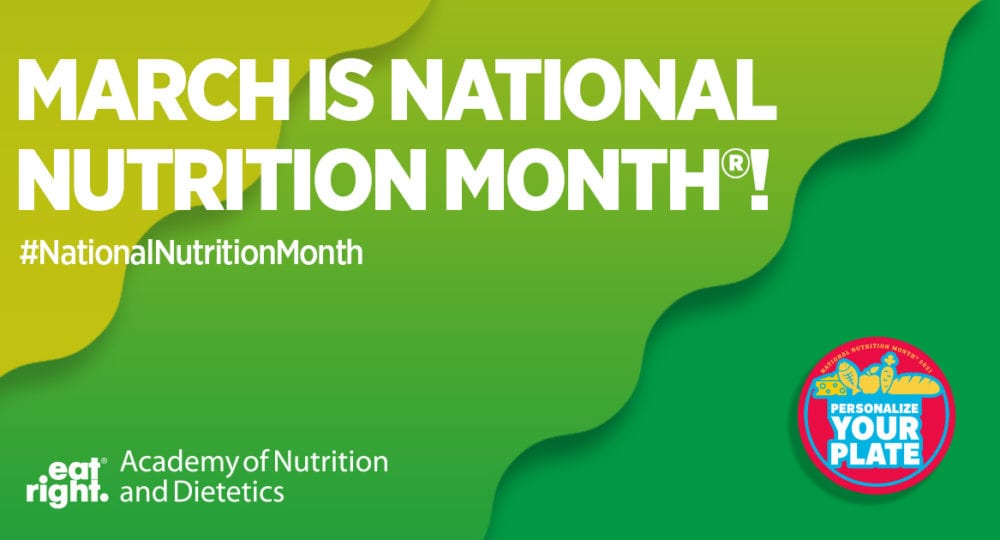The theme for this year’s National Nutrition Month® is Personalise Your Plate. There is no one-size-fits-all approach to nutrition and health. This month of awareness allows us time to re-think what choices we are making with both our eating habits and our activity habits.
The Academy of Nutrition and Dietetics has been promoting the importance of nutrition and educating people nationwide on the importance of nutrition and physical activity since 1973.
On the eatright.org website, there are various educational materials and reminders that are invaluable resources to review during this month of awareness or anytime throughout the year.
Diet:
Did you know your diet can help prevent chronic disease conditions? Per the www.eatright.org website, the following health concerns are directly related to diet.
- Heart disease and stroke
- Heart disease is the leading cause of death in the U.S. and is responsible for 1 in every 3 deaths.
- Stroke is the cause of 1 in 18 deaths in the U.S.
- Obesity
- 1 in 3 adults in the U.S. suffers from obesity
- 16% of children and young adults ages 6-19 are considered obese
- Cancer
- Eating less fat can help reduce your risk of developing breast or ovarian cancer.
- Moderate to vigorous exercise can lower your risk of developing colon cancer by as much as 30%.
- Osteoporosis
- 8% of 20+ year old females are affected by osteoporosis
- Not ensuring Vitamin D and Calcium are a consistent part of your diet can increase your risk of developing osteoporosis.
- Diabetes
- Greater than 18 million people in the U.S. have Type II diabetes and this is predicted to rise by 33% between now and 2050.
- Approximately 13% of young people ages 12-19 suffer from a metabolic syndrome which predisposes them to diabetes as an adult.
Physical Activity:
Did you know, for optimal health, it is recommended:
- Adults partake in 150 minutes of physical activity per week
- Children/young adults partake in 60 minutes of physical activity each day
Making Healthy Food Selections:
Key Nutrients: for a strong and healthy body, follow the guidelines below when planning out your meals. Be sure to eat a variety of foods from each food group.
- Vegetables
- Dark green vegetables like leafy greens or broccoli as well as orange vegetables like carrots and sweet potatoes are packed with nutrients.
- Protein
- Try to select different sources of protein such as fish, beans and lentils. When eating meat, try to select low-fat options such as lean ground beef, turkey or chicken. Avoid processed meats such as hot dogs, sausages, salami, bacon, etc.
- Whole Grains
- A minimum of 3 ounces per day is recommended. Whole grains can be found in cereal, bread, crackers, rice, and pasta.
- Dairy
- Selecting low-fat or fat-free options for milk, yogurt and cheese is a healthier choice.
- Beverages
- Water or low-fat/fat-free milk is the healthiest drink option. Try adding lemons, limes or cucumbers to your water to give it some flavor. Unsweetened carbonated water is also a good option. 100% fruit juice is another option but should be consumed in moderate amounts.
- Desserts
- Selecting fresh fruit vs. dessert is always a better option than cookies, cakes, pastries, etc.
Other things to be mindful of when cooking meals or selecting items at the grocery store for purchase:
- Food Preparation
- Using food prep methods such as grilling, broiling, baking or steaming foods instead of frying is always a healthier option. Also, using healthier oils such as olive, canola and sunflower oils to replace partially hydrogenated oils or butter is a good alternative too.
- Added Sugars
- Try to select foods that have “no added sugar” or are labeled as “unsweetened” such as applesauce or whole-grain cereals.
- Sodium Content
- Using salt as a primary seasoning is not the best option. Get creative and try other herbs and spices. Read nutrition labels for salt/sodium content especially on pre-made foods such as frozen goods, bread, and canned foods.
Being mindful about food choices will help you maintain a healthy diet, healthy weight and give you the energy you need to be more active!
—
Resources:
Featured image courtesy of Eatright.org





